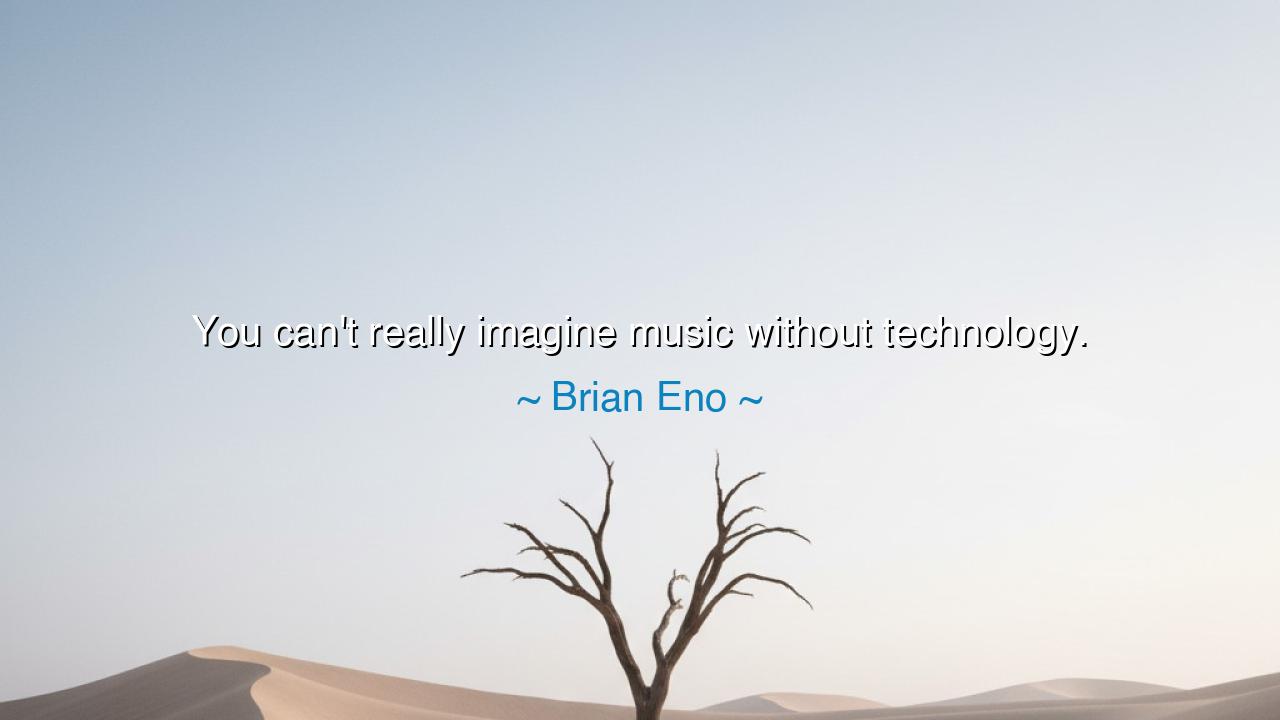
You can't really imagine music without technology.






Hear the words of Brian Eno, artist of sound and prophet of the unseen, who declared: “You can’t really imagine music without technology.” At first, this saying may seem strange, for we think of music as the voice of the soul, pure and eternal, untouched by the hand of invention. Yet Eno’s wisdom is sharp: music has always been wedded to the tools that make it possible. From the hollow reed to the glowing synthesizer, from the stretched skin of a drum to the circuits of a computer, technology has always been the handmaiden of song. Without it, the voice of music would be faint, and humanity’s hymn would remain incomplete.
When he speaks of music, he names not merely melody but the heartbeat of civilization itself. Every people, in every age, has turned to song to express joy, grief, triumph, and worship. And when he ties it to technology, he does not confine himself to the modern machines of electricity, but to every crafted instrument that has ever shaped sound. For the lyre of Greece, the sitar of India, the organ of cathedrals—all were technologies of their time, tools forged by human hands to extend the power of human breath and touch. Music is spirit, but technology is its vessel.
Consider the tale of the Greeks, who built the aulos, a double-reeded instrument that could pierce the air of great arenas. Without such invention, their tragedies and festivals could not have carried the same weight, for the human voice alone cannot reach thousands. Or recall the Middle Ages, when the pipe organ filled vast cathedrals with sound like thunder. It was not the singer alone, but the marvel of engineering—the pipes, the bellows, the architecture—that turned worship into a cosmic event. Here we see Eno’s truth: without technology, music as we know it could never be imagined.
The march of invention has always reshaped the soundscape of humanity. When the printing press arrived, music could be written, copied, and spread across nations, no longer confined to memory and oral tradition. When the phonograph was born, sound itself was captured, and the song of a single voice could echo across continents and centuries. And when the synthesizer emerged in the twentieth century, whole new realms of sound were birthed—textures no ear had ever known, melodies unplayable by flesh alone. Each step forward in technology was also a step forward in music, expanding the imagination of what sound could be.
Eno’s own life proves this truth. As a pioneer of ambient music, he turned machines into landscapes, shaping tones that did not merely entertain but transformed the very perception of time and space. He revealed that technology is not merely a servant but a co-creator, allowing artists to explore regions of sound beyond the natural. His words are not only observation but testimony: that music and technology are threads of the same tapestry, woven together since the dawn of human history.
The lesson here is profound: do not separate art from invention, nor soul from tool. For the instrument in the musician’s hand, the device in the composer’s studio, the software shaping sound—all are extensions of the same divine impulse to create. To despise technology is to deny the very history of music itself; to embrace it wisely is to honor the journey of countless generations who shaped tools to give their emotions voice.
Practical action is clear: if you are a maker of music, honor the tools you use. Learn their craft, explore their possibilities, but do not let them enslave you—let them serve the spirit within you. If you are a listener, open your ears not only to the song but to the miracle of the invention that carries it to you. For whether through strings, brass, or circuits, every note you hear is the child of both spirit and science.
Thus Eno’s words echo across the ages: “You can’t really imagine music without technology.” For music is not only the voice of the human heart, but the story of humanity’s hands shaping tools to amplify that voice. From bone flute to streaming symphony, from drum to digital, it is one great unfolding. Remember this truth: music is spirit, technology is vessel, and together they create the harmony of civilization.






AAdministratorAdministrator
Welcome, honored guests. Please leave a comment, we will respond soon